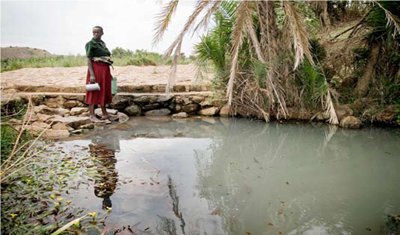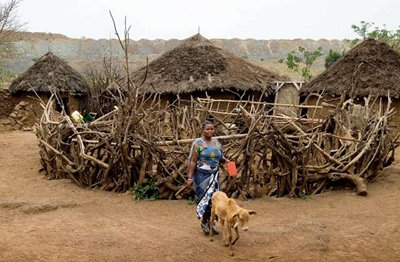|
|
|
|
Barrick Gold en:
Argentina
- Australia
- Chile
- Kirguistán
- Perú
Fuente:
Corruption Tracker
10 de mayo de 2009
Thanks to Barrick Gold operations:
70 Billions lost in bad mining contracts, Tanzania suffers
By Tanzania Corruption Tracker System
The signing of lopsided mining contracts by highly placed government officials is reported to be causing Tanzania financial loss of 50m US dollars (70bn Tanzanian shillings) per annum.
Since the signing of such contracts ten years ago, Tanzania could be said to have lost 500m US dollars (700bn Tanzanian shillings), quite a staggering sum which could have changed, considerably, the country's economy had such contracts been designed in a way that would have been beneficial to the country.
The foregoing figure was pointed out by officials of the opposition Chama cha Demokrasia na Maendeleo (Chadema) during their campaign rallies in the run up to the Busanda constituency by-election scheduled for Sunday, May 24th 2009.
Although the financial figure Tanzania is alleged to have been losing since it first allowed in investors in the mining sector is staggering. Chadema officials' allegation on the massive financial loss was quoted by a privately owned local television station, ITV during its 8pm news bulletin aired on Monday, May 18th 2009.
The figures are also collaborated by an independent study on Gold Mining in Tanzania commissioned by religious organizations in Tanzania in 2008. According to the report titled: Golden Opportunity; How Tanzania is failing to Benefit from Gold Mining, published by Tanzania's religious organizations, Tanzania Episcopal Conference (TEC), The National Muslim Council (BAKWATA) and the Christian Council of Tanzania (CCT), the combined lost income to Tanzania arising from low royality rate, unpaid corporation tax and alleged tax evasion is at least USD400million over the past seven years.
'This is a very conservative estimate, in that it does not cover all the gold mining companies or all figures for the past seven years (which are not publicly available). Neither does it cover the financial costs of other tax incentives such as VAT exemption, which are extremely difficult to estimate. These extra revenues could of course provide a huge boost to tackling poverty in Tanzania' the report reads in part
The environmental impact of dubious Mining Activities in Tanzania
Combined with the allegations of corruption and dubious mining contracts are the environmental aftermath from the mining operations in Tanzania.
The environmental impact from Mining operations is not only threatening the social livelihoods of communities living around the mining operations but its negative ramifications to development may be very difficult to determine. One example of such devastating set back to development includes the Toxic spill and environmental disaster which was reported in May 2009 at the Canadian Barrick Gold's North Mara Mine.
According to well informed sources, chemically contaminated water from the mine's storage pond overflew into the nearby Tigithe River and thereby threatening human, livestock and plants. The overflowing of the water from the pond is said to have been caused by heavy rains that fell in the area and vandalism of the plastic sheeting of the water ponds.
The local residents from the area however dispute this and attribute the toxic spill to sheer 'negligence' on the part of the Gold Mining Company and government's failure to put large scale Mining Companies under close scrutiny. The Mining Contracts signed under dubious circumstances, involving corrupt government officials, contain claw back provisions that have tacitly compelled the Government to keep a 'hands off' stance from the Mining Companies and thus allowed them to reap the mining resources with minimal interference and less regard for the economic and environmental impacts accruing from mining activities in the Country.
A Dar es Salaam based investigative English daily, THISDAY quotes the Tarime District Councillor, Mr Agostino 'Neto' Sasi as saying that trees along the river bank are now dying and at least three children and one elderly man have experienced skin problems after coming into contact with the water. "The river has overflowed into the surrounding fields and caused crops such as millet, maize and sorghum also to dry up. At least five cows have died from drinking water from the river."
The Matongo Ward Councillor, Machage B. Machage said cattle, fish and plants were dying as a result of the chemically contaminated water. He said efforts to seek government assistance by scientifically testing the water had not borne fruits as the latter insisted, after testing the water, that the liquid was safe.
He however, said that when they asked those who had carried out the tests from the government to drink the water they had claimed to be safe both for human and livestock consumption, they refused!
Machage said they had asked for government's assistance in testing the water because they did not accept Barrick Gold's continued claim that the water was safe.
On Monday, Mr Sasi who is a retired Tanzania Peoples Defence Forces soldier told a radio journalist that his belief that the water in their area was contaminated lay in the fact that it had no living things such as fish. He said during his tenure in the army, they had been educated to drink water in the forest if they found it to be containing living things such as fish and other living organisms.
"Water that is still and does not contain any living organisms is not fit for human consumption", he said in apparent response to a question on what made him think that the water was contaminated when he could not provide scientific evidence.
What has inflicted people, livestock, fish and plants in Mr Sasi's area is tragic and the environmental degradation it has caused and continues to in its wake will not only take a long time to repair but would also cost the nation heavily.
Unfortunately this is not the first time that people from the area are complaining about the contamination of water from their area.
Residents from the area have from time to time raised the red flag, but no one, least of all the government which was in the first place involved in the signing of the contract has shown any interest!
 This is a water hole that was built by Barrick Gold near their North Mara Gold mine on behalf of the local communities. The edge of the mine pit can be seen in the upper left-hand corner. But the water appears milky and dirty and the plants around the water hole are dying.
This is a water hole that was built by Barrick Gold near their North Mara Gold mine on behalf of the local communities. The edge of the mine pit can be seen in the upper left-hand corner. But the water appears milky and dirty and the plants around the water hole are dying.
The mine's General Manager, Kevin Moxham, has argued that the ongoing violent conflicts with locals is
to blame; "we spend a lot of time and resources to deal with crime incidents instead of funding development projects. This also reduces the cake that could have gone into improving the livelihood of the North Mara community, Tarime district and Mara region in general." (Photo By Allan Lissner, 2008)
Government's detachment from mining problems
What is however, worrying is that the very government that is dogged with reports of signing dubious contracts and circumstantial evidence of corruption implicating high ranking officials in the Ministry f Minerals and Energy has recently reported to have allowed foreign investors to embark on more dangerous mining, uranium!
The million dollar question is that if the government cannot ensure that investors take precautionary measures against pollution in the course of their gold mining activities, how is the government going to protect the environment where more dangerous minerals such as uranium is involved?
We all remember what happened at the Chernobly in Ukraine in 1986 when nuclear power plant had leaks. Although the leaks were finally blocked, but the damage to the environment had already been done. To date, hundreds of children are being born close to the area with various kind of deformity as a result of the leak of the nuclear waste.
The question that the Tanzanian government ought to ask itself is if the then highly developed Soviet government could not stop the nuclear leak then, how is underdeveloped Tanzania going to succeed when it cannot even handle chemical waste from gold mining as evidenced by the North Mara Mine? Does the government really need to go into mining dangerous minerals such as uranium at this stage without any mechanisms for blocking crevices of corruption in the mining sector?
 The Mwita family lives in Nyamongo next to Barrick's North Mara gold mine.
The Mwita family lives in Nyamongo next to Barrick's North Mara gold mine.
The waste rock on the edge of the mining pit can be seen just behind their huts here. Ongoing conflict between the mine and local communities have created a climate of fear for those who live nearby. Since the mine opened in 2002, the Mwita family say that they live in a state of constant anxiety because they have been repeatedly harassed and intimidated by the mine's private security forces and by government police. There have been several deadly confrontations in the area and every time there are problems at the mine, the Mwita family say their compound is the first place the police come looking. During police operations the family scatters in fear to hide in the bush, "like fugitives," for weeks at a time waiting for the situation to calm down. They used to farm and raise livestock, "but now there are no pastures because the mine has almost taken the whole land ... we have no sources of income and we are living only through God's wishes. ... We had never experienced poverty before the mine came here." They say they would like to be relocated, but the application process has been complicated, and they feel the amount of compensation they have been offered is "candy." (Photo by Allan Lissner-, 2008)
What the present crop of leadership ought to realize is that the Father of the Nation, Mwalimu Julius Nyerere knew the existence of uranium and other minerals immediately the country won its independence. This is because the location of various minerals as we know it today was well documented by Germans during their short spell in the country before the First and Second World Wars.
But because Mwalimu was then well informed about the politics of minerals through reading and by his close friend, Algerian leader, Mr Ben Bella, he decided that it was better to put all the country's efforts in agriculture while the government trained locals abroad in mining technology.
It was at this time in the late 1960s that the government came up with what came to be known as the 20 Year Industrialization Programme under which many young Tanzanians were sent to the Eastern European countries where they were trained in metallurgy, production engineering just to mention a few.
Mwalimu's decision would later be proved right when Nigeria abandoned agriculture after discovering oil, a development that would turn the country into a net food importer instead of an exporter. To date, the western African nation has failed to make good use of its abundant oil resource for its economic development!
Thus oil would later become a curse to Nigeria just as the abundance of minerals in Sierra Leone (diamond) and the Democratic Republic of Congo have and continue to become a curse to these countries. The DRC continues to be embroiled in endless wars mainly caused by its rich mineral resources which have become a curse rather than a blessing! Where there is corruption and misgovernance, there will be always turmoil and organized chaos.
|
|